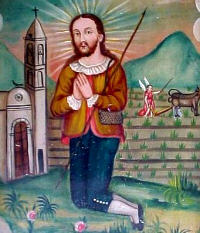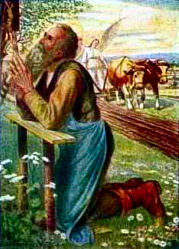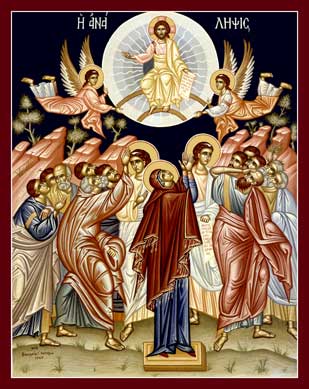11. And now I am no more in the world, but these are in the world, and I come to you. Holy Father, keep through your own name those whom you have given me, that they may be one, as we are.
12. While I was with them in the world, I kept them in your name: those that you gave me I have kept, and none of them is lost, but the son of perdition; that the scripture might be fulfilled.
13. And now come I to you; and these things I speak in the world, that they might have my joy fulfilled in themselves.
CHRYS. And now I am no more in the world: i.e. though I no longer appear in the flesh, I am glorified by those who die for Me, as for the Father, and preach Me as the Father.
AUG. At the time at which He was speaking, both were still in the world. Yet we must not understand, I am no more in the world, metaphorically of the heart and life; for could there ever have been a time when hen He loved the things of the world? It remains then that He means that He was not in the world, as He had been before; i.e. that He was soon going away. Do we not say every day, when any one is going to leave us, or going to die, such an one is gone? This is shown to be the sense by what follows; for He adds, And now I come to You. And then He commends to His Father those whom He was about to leave: Holy Father, keep through Your own name those whom you have given Me. As man He prays God for His disciples, whom He received from God. But mark what follows: That they may be one, as We are: He does not say, That they may be one with us, We are one: but, that they may be one: that they may b one in their nature, as We are one in Ours. For, in that He was God and man in one person as man He prayed, as God He was one with Him to Whom He prayed.
AUG. He does not say, That I and they maybe one, though He might have said so in the sense, that He was the head of the Church, and the Church His body; not one thing, but one person: the head and the body being one Christ. But strewing something else, viz. that His divinity is consubstantial With the Father, He prays that His people may in like manner be one; but one in Christ, not only by the same nature, in which mortal man is made equal to the Angels, but also by the same will, agreeing most entirely in the same mind, and melted into one Spirit by the fire of love. This is the meaning of, That they may be one as We are: viz. that as the Father and the Son are one not only by equality of substance, but also in will, so they, between whom and God the Son is Mediator, may be one not only by the union of nature, but by the union of love.
CHRYS. Again He speaks as man: While I was with them in the world, I kept them in your name; i.e. by your help. He speaks in condescension to the minds of His disciples, who thought they were more safe in His presence.
AUG. The Son as man kept His disciples in the Father's name, being placed among them in human form: the Father again kept them in the Son's name, in that He heard those who asked in the Son's name. But we must not take this carnally, as if the Father and Son kept us in turns, for the Father, Son, and Holy Ghost guard us at the same time: but Scripture do does not raise us, except it stoop to us. Let us understand then that when our Lord says this, He is distinguishing the persons, not dividing, the nature, so that when the Son was keeping His disciples by His bodily presence, the Father was waiting to succeed Him on His departure; but both kept them by spiritual power, and when the Son withdrew His bodily presence, he still held with the Father the spiritual keeping . For when the Son as man received them into His keeping , He did not take them from n the Father's keeping, and when the Father gave them into the Son's keeping , it was to the Son as man, who at the, same time was God. Those that you gave Me I have kept, and none of them is lost but the Son of perdition: i.e. the betrayer of Christ, predestined to perdition; that the Scripture might be fulfilled, especially the prophecy, in Psalm 108.
CHRYS. He was the only one indeed who perished then, but there were many after. None of them is lost, i.e. as far as I am concerned; as He says above more clearly; I will in no wise cast out. But when they cast themselves out, I will not draw them to Myself by dint of compulsion. It follows: And now I come to you. But some one might ask, Can you not keep them? I can. Then why say you this? That they may have my joy fulfilled in them, i.e. that they may not be alarmed in their as yet imperfect state.
AUG. Or thus: That they might have the joy spoken of above: That they may be one, We are one. This spoken i.e. bestowed by Him, He says, is to be fulfilled in them on which account He spoke thus in the world. This joy is the peace and happiness of the life to come. He says He spoke in the world, though He had just now said, I am no more in the world. For, inasmuch as He had not yet departed, He was still here; and inasmuch as He was going to depart, He was in a certain sense not here.
14. I have given them your word; and the world has hated them, because they are not of the world, even as I am not of the world.
15. I pray not that you should take them out of the world, but that you should keep them from the evil.
16. They are not of the world, even as I am not of the world.
17. Sanctify them through your truth; your word is truth.
18. As you hast sent me into the world, even so have I also sent them into the world.
19. And for their sakes I sanctify myself, that they also might be sanctified through the truth.
CHRYS. Again, our Lord gives a reason why the disciples are worthy your of obtaining such favor our from the Father: I have given them your word; and the world has hated them; i.e. They are had in hatred for your sake, and on account of your word.
AUG. They had not yet experienced these sufferings which they afterwards met with; but, after His custom, He puts the future into the past tense. Then He gives the reason why the world hated them; viz. Because they are not of the world. This was conferred upon them by regeneration; for by nature they were of the world. It was given to them that they should not be of the world, even as He was not of the world; as it follows; Even as I am not of the world.
He never was of the world; for even His birth of the form of a servant He received from the Holy Ghost, from Whom they were born again. But though they were no longer of the world, it was still necessary that they should be in the world: I pray not that you should take them out of the world.
BEDE. As if to say, The time is now at hand, when I shall be taken out of the world; and therefore it is necessary that they should be still left in the world, in order to preach Me and You to the world. But that you should keep them from the evil; every evil, but especially the evil of schism.
AUG. He repeats the same thing again; They are not of the world, even as I am not of the world.
CHRYS. Above, when He said, Then whom you gave Me out of the world, He meant their nature; here He means their actions. They are not of the world; because they have nothing, in common with earth they are made citizens of heaven. Wherein He shows His love for them, thus praising them to the Father. The word as when used with respect to Him and the Father expresses likeness of nature; but between us and Christ there is immense distance Keep them from the evil, i.e. not from dangers only, but from falling away from the faith.
AUG. Sanctify them through your truth: for thus were they to be kept from the evil. But it may be asked, how it was that they were not of the world, when they were not yet sanctified in the truth? Because the sanctified have still to grow in sanctity, and this by the help of God's grace. The heirs of the New Testament are sanctified in that truth, the shadows of which were the sanctification of the Old Testament; they are sanctified in Christ, Who said above, I am the way, the truth, and the life. It follows, your discourse is truth. The Greek is i.e. word. The Father then sanctified them in the truth, i.e. in His Word the Only-Begotten, them, i.e. the heirs of God, and joint-heirs With Christ.
CHRYS. Or thus: Sanctify them in your truth; i.e. Make them holy, by the gift of the Holy Spirit, and sound doctrines: for sound doctrines give knowledge of God, and sanctify the soul. And as He is speaking of doctrines, He adds, your word is truth, i.e. there is in it no lie, nor anything typical, or bodily. Again, Sanctify them in your truth, may mean, Separate them for the ministry of the word, and preaching.
GLOSS. As you have sent Me into the world, even so have 1 also sent them into the world. For what Christ was sent into the world, for the same end were they as said Paul, God was in Christ reconciling the world to Himself; and has given to us the word of reconciliation. As does not express perfect likeness between our Lord and His Apostles, but only as much as was possible in men. Have sent them, He says, according to His custom of putting the past for the future.
AUG. It is manifest by this, that He is still speaking of the Apostles; for the very word Apostle means in the Greek, sent. But since they are His members, in that He is the Head of the Church, He says, And for their sakes I sanctity Myself; i.e. I in Myself sanctify them, since they are Myself. And to make it more clear that this was His meaning, He adds, That they also might be sanctified through the truth, i.e. in Me; inasmuch as the Word is truth, in which the Son of man was sanctified from the time that the Word was as made flesh. For then He sanctified Himself in Himself, i.e. Himself as man, in Himself as the Word: the Word and man being one Christ.
But of His members it is that He said, And for their sakes I sanctify Myself, i.e. them in Me, since in Me both they and I are. That they also might be sanctified in truth: they also, i.e. even as Myself; and in the truth, i.e. Myself.
CHRYS. Or thus: for their sakes I sanctify Myself, i.e. I offer Myself as a sacrifice to You; for all sacrifices, and things that are offered to God, see called holy. And whereas this sanctification was of old in figure, (a sheep being the sacrifice,) but now in truth, He adds, That they also might be sanctified through the truth: i.e. For I make them too an oblation to You, either meaning that He who was offered up was their head, or that they would be offered up too: as the Apostle says, Present your bodies a living sacrifice, holy.
Catena Aurea John 17




 When he was barely old enough to wield a hoe, Isidore entered the service of John de Vergas, a wealthy landowner from Madrid, and worked faithfully on his estate outside the city for the rest of his life. He married a young woman as simple and upright as himself who also became a saint-Maria de la Cabeza. They had one son, who died as a child.
When he was barely old enough to wield a hoe, Isidore entered the service of John de Vergas, a wealthy landowner from Madrid, and worked faithfully on his estate outside the city for the rest of his life. He married a young woman as simple and upright as himself who also became a saint-Maria de la Cabeza. They had one son, who died as a child.  Daughter of a pagan Irish chieftain named Damon, and a beautiful devoted Christian woman whose name has not come down to us. Her mother died when Dymphna was a teenager. Her father searched the Western world for a woman to replace his wife, but none could. Returning home, he saw that his daughter was as beautiful as her mother, and maddened by grief, he made advances on her. She fought him off, then fled to Belgium with Saint Gerebernus, an elderly priest and family friend.
Daughter of a pagan Irish chieftain named Damon, and a beautiful devoted Christian woman whose name has not come down to us. Her mother died when Dymphna was a teenager. Her father searched the Western world for a woman to replace his wife, but none could. Returning home, he saw that his daughter was as beautiful as her mother, and maddened by grief, he made advances on her. She fought him off, then fled to Belgium with Saint Gerebernus, an elderly priest and family friend. 



